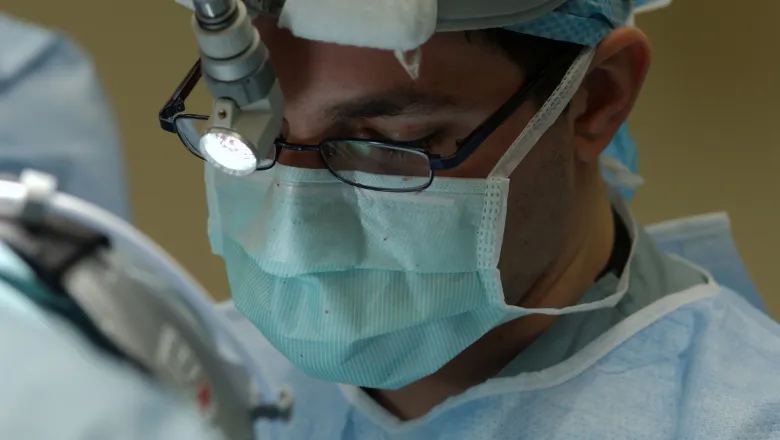We know that different types of antibodies cause different immune responses in the body. We think IgE will act differently to other antibodies previously tested. This trial investigates if this difference can change how a patient’s immune system targets cancer. “This is a huge step in the development of a new type of immunotherapy, which could in the future benefit cancer patients. But it’s important to remember that this is early stage work and more trials are needed to see just how effective IgE drugs will be. And it is likely to be a number of years before these treatments are the norm. Like almost all experimental cancer treatments around the world this trial of MOv18 IgE is paused during the COVID-19 pandemic, but we hope to restart recruitment later this year.
Prof James Spicer, trial lead from the School of Cancer and Pharmaceutical Sciences
27 April 2020
New class of immunotherapy drug shows promise in early clinical trial
Results are disclosed today from the world’s first clinical trial of a new class of immunotherapy drugs which fight cancer using one of the body’s natural defences against parasites.

The antibody, called MOv18 IgE, was discovered and developed at King’s, with support from the National Institute of Health Research (NIHR) Guy’s and St Thomas’ Biomedical Research and tested in patients at hospitals in London and Cambridge. The clinical trial is funded, sponsored and managed by Cancer Research UK’s Centre for Drug Development and supported by NIHR Clinical Research Facility at Guy’s and St Thomas’ NHS Foundation Trust. Early results were presented today at the virtual annual meeting of the American Association for Cancer Research.
Immunotherapy works by stimulating the body’s own natural defence system to attack cancer. All existing antibody drugs used in cancer belong to an antibody type called IgG, but the new trial has for the first time tested an IgE antibody, called MOv18 IgE.
Because the immune system reacts differently to IgE antibodies these types of drugs could potentially stimulate a more effective reaction against cancer. The new immunotherapy could also attack the disease in entirely new ways as IgE antibodies alert and employ different immune cells. The common immunotherapy drugs in use today utilise IgG antibodies which are naturally involved in attacking bacteria and viruses in the body, but these IgE antibodies are naturally involved in targeting parasites like worms and flukes.
This phase I clinical trial gives increasing doses of MOv18 IgE to patients with advanced cancer***, whose tumour cells have high levels of folate receptor alpha, the target of this antibody, on their surface. High levels of folate receptors are found across lots of different tumour types and are most commonly overexpressed in ovarian cancer.
Like all phase I trials the main aim of this study was to determine whether the drug can be given to patients safely. Treatment with MOv18 IgE has been well tolerated in almost all patients. The most common toxicity was readily manageable urticaria, also called nettle rash or hives. Although this is just the first step in the clinical development of IgE drugs, preliminary evidence of transient anti-cancer activity was seen in a patient with ovarian cancer. Global rights to MOv18 IgE have recently been in-licensed by Epsilogen.
Prof Sophia Karagiannis, School of Basic & Medical Biosciences, chief scientist on the trial from the NIHR Guy’s and St Thomas’ BRC, said: “We’ve spent many years studying this new class of immunotherapy and it’s very exciting that we’ll now be able to see if this could work in cancer patients. Based on our previous research we hope that using the IgE antibody will train the immune system to specifically seek out and attack cancer cells in the same way it responds to parasites.”
Dr Nigel Blackburn, Cancer Research UK’s director of drug development, said: “We’ve made great strides in the use of immunotherapies in cancer, but so far we’ve only worked with a handful of the different types of immune cells. The IgE antibody could increase our arsenal against the disease by tapping into defences we haven’t previously explored.
“This clinical trial is a mammoth achievement for the Cancer Research UK Centre for Drug Development and wouldn’t have been possible without the work of the dedicated teams here and at King’s. If IgE immunotherapy works well it could move the field of immunotherapy forward in a new direction.”
The project was developed by scientists from King’s College London in collaboration with the Cancer Research UK Centre for Drug Development. The MOv18 IgE drug was made by Cancer Research UK’s Biotherapeutics Development Unit. The trial receives infrastructure support from the NIHR Guy’s and St Thomas’ BRC and the King’s Health Partners Experimental Cancer Medicine Centre. Additional clinical sites recruiting patients are Cambridge University Hospitals, University College London Hospital and Royal Marsden Hospital.
This trial is currently on hold, during the COVID-19 pandemic, but it is hoped recruitment will restart later this year.


